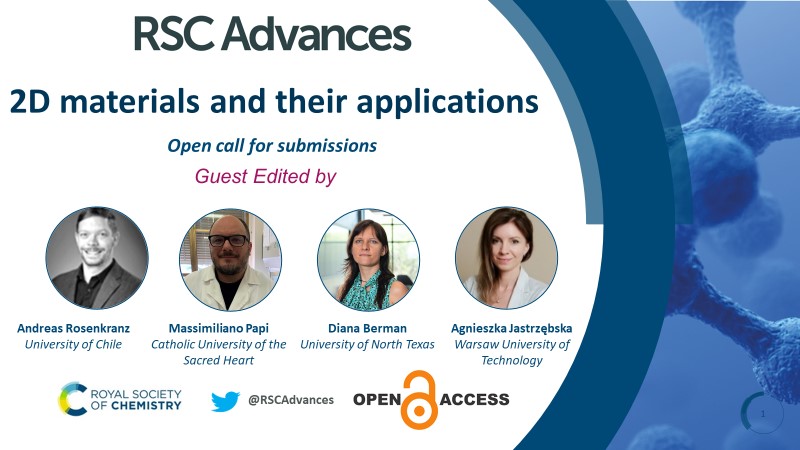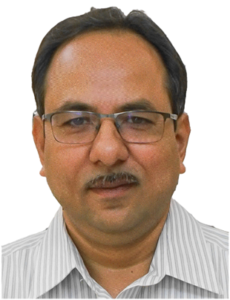RSC Advances is delighted to announce a new themed collection on 2D materials and their applications. This collection is Guest Edited by Associate Professor Andreas Rosenkranz, University of Chile, Associate Professor Massimiliano Papi, Catholic University of the Sacred Heart, Associate Professor Agnieszka Jastrzębska, Warsaw University of Technology, and Associate Professor Diana Berman, University of North Texas.
Scope
During the last decade, 2D materials have gained tremendous attention in the scientific community due to their structural and physiochemical properties, which make them applicable in various fields of fundamental and applied research. Inspired and boosted by the performance of graphene and its derivates as well as transition metal dichalcogenides (TMDs), with their most prominent members being MoS2 and WS2, significant progress has been made towards the development of new 2D nanomaterials.
In this regard, advanced synthesis routes, as well as an in-depth understanding of the structure-property-performance relationship, are currently being explored for silicenes, hexagonal boron nitride (h-BN), 2D black phosphorus, halide structures, metal-organic frameworks (MOFs), covalent-organic frameworks (COFs), MXenes and MBenes. Their high surface-to-volume ratios coupled with controllable electrical and thermal conductivity, and excellent mechanical properties have made 2D nanomaterials particularly interesting for energy storage/harvesting and supercapacitors, (photo)-catalysis, water purification/desalination, wearable electronics, biomedicine, tribology, and much more.
This multidisciplinary themed collection provides the opportunity to share latest findings related to applied research involving 2D materials with the research community.
Topics include, but are not limited to, the following:
- New synthesis approaches for 2D materials,
- Chemical functionalization of 2D materials,
- Fabrication of nanocomposites and their functionalization,
- Advanced, high-resolution materials characterization (chemical and structural),
- Unique physical and chemical properties of 2D materials,
- Experimental and computational studies related to the use of 2D materials in energy storage/harvesting, (photo)-catalysis, water purification/desalination, wearable electronics, tribology, among others,
- Biomedical applications of 2D materials such as drug delivery, gene therapy, regenerative medicine, oncology, and
- Innovative biosensors based on the 2D materials physical/chemical features.
We welcome your submission to the series.
Submission deadline: 31st October 2023
How to submit
Both papers and review articles will be considered for this themed collection. All submissions will be subject to an initial assessment by Associate Editors and, if suitable for the journal, they will be subject to rigorous peer review to meet the usual high standards of RSC Advances.
We are proud to be an affordable gold open access journal. Submissions to RSC Advances will be published open access and the appropriate article processing charge (APC) will apply. RSC Advances’ article processing charge (APC) is among the lowest in chemistry and waivers are also available for authors who meet the eligibility criteria outlined here.
If you would like to submit to this themed collection the manuscript should be prepared according to our article guidelines and submitted via our online system any time before the submission deadline of 31 10 2023. During submission, authors will be asked if they are submitting for a themed collection and should include the name of the themed collection. If you would like to submit but require additional time to prepare your article, please do let us know by contacting the journal.
Submit to RSC Advances today! Check out our author guidelines for information on our article types or find out more about the advantages of publishing in a Royal Society of Chemistry journal.
Keep up to date with our latest Popular Advances, Reviews, Collections & more by following us on Twitter. You can also keep informed by signing up to our E-Alerts.















